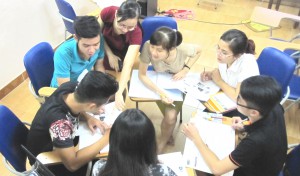Chắc hẳn ai cũng biết các bài writing mẫu có thể giúp chúng ta học để nâng trình. Tuy nhiên, sử dụng chúng như thế nào để có hiệu quả là điều cần lưu ý.
Theo mình, trước hết cần xác định các bài mẫu này dùng để HỌC chứ không phải ĐỌC.
Thay vì dịch sơ qua từ tiếng Anh sang tiếng Việt để hiểu bề mặt nghĩa của từ hay cụm từ, bạn hãy học bằng tra nghĩa Anh Anh/Mỹ để hiểu sâu hơn. Tại sao người viết lại dùng từ này mà không dùng từ đồng nghĩa khác, tại sao từ này lại phù hợp trong văn cảnh hơn.
Cũng vì việc học cách dùng từ sao cho chuẩn với văn cảnh nên mình thường học các bài mẫu của các giáo viên nước ngoài. Nếu là các bài viết hay nói mẫu thì mình thường học của Simon, Cullen, hoặcLiz.
Dưới đây là một bài phân tích bài viết mẫu band 9 của Simon. Gửi các bạn tham khảo.
Question: Foreign visitors should pay more than local visitors for cultural and historical attractions. To what extent do you agree or disagree with this opinion?
Simon’s sample:
It is sometimes argued that tourists from overseas should be charged more than local residents to visit important sites and monuments. I completely disagree with this idea.
The argument in favour of higher prices for foreign tourists would be that cultural or historical attractions often depend on state subsidies to keep them going, which means that the resident population already pays money to these sites through the tax system. However, I believe this to be a very shortsighted view. Foreign tourists contribute to the economy of the host country with the money they spend on a wide range of goods and services, including food, souvenirs, accommodation and travel. The governments and inhabitants of every country should be happy to subsidise important tourist sites and encourage people from the rest of the world to visit them.
If travellers realised that they would have to pay more to visit historical and cultural attractions in a particular nation, they would perhaps decide not to go to that country on holiday. To take the UK as an example, the tourism industry and many related jobs rely on visitors coming to the country to see places like Windsor Castle or Saint Paul s Cathedral. These two sites charge the same price regardless of nationality, and this helps to promote the nation s cultural heritage. If overseas tourists stopped coming due to higher prices, there would be a risk of insufficient funding for the maintenance of these important buildings.
In conclusion, I believe that every effort should be made to attract tourists from overseas, and it would be counter productive to make them pay more than local residents.
Phân tích:
1. It is sometimes argued that tourists from overseas should be charged more than local residents to visit important sites and monuments. I completely disagree with this idea.
– Charge (v): to ask an amount of money for something, especially a service or activity:
e.g., How much/What do you charge for a haircut?
e.g., The local museum doesn’t charge for admission
– monument (CN): an old building or place that is an important part of a country’s history
e.g., Parts of the Berlin wall are being allowed to stand (to exist in its current form) as historic monuments
2. The argument in favour of higher prices for foreign tourists would be that cultural or historical attractions often depend on state subsidies to keep them going, which means that the resident population already pays money to these sites through the tax system.
- Subsidy/ˈsʌb.sə.di/ (CN): money given by a government or an organization to reduce the cost of producing food, a product, etc. and to help to keep prices low
e.g., government/public/state subsidies
agricultural/export/farm subsidies
provide/receive/get a subsidy
subsidy for st: subsidies for the nuclear, oil, gas and coal industries.
- Keep st Ving: keep in a particular state, remain st
- Population: A countable noun usually used in the singular: all the people live in one country
- Pay to somewhere/ pay (to) someone/ pay for st/ pay (in/with/by) cash: give money to sb
e.g., How much did you pay for the tickets?
– pay someone for Ving: Did Linda pay you for looking after her cats while she was away?
3. However, I believe this to be a very shortsighted view. Foreign tourists contribute to the economy of the host country with the money they spend on a wide range of goods and services, including food, souvenirs, accommodation and travel.
- Believe + that (clause)
- Believe + object + to V: I believe her to be the finest doctor in the world
- Believe +object + Adj: All the crew are missing, believed dead.
- Shortsighted (adj): showing a lack of thought for what might happen in the future
- Contribute to st: give st especially money, in order to provide or achieve something together with other people
e.g., Her family has contributed $50,000 to the fund.
– range: a set of similar things of the same general type
e.g., the area offers a wide range of activities for the tourist
– travel (UN): the activity of traveling, usually over a long distance
e.g., A lot of my travel is business related.
– travels (CN – pl) = journeys/ trips
e.g., I’ve met some pretty interesting people in my travels
4. The governments and inhabitants of every country should be happy to subsidise important tourist sites and encourage people from the rest of the world to visit them.
- Subsidize /ˈsʌb.sə.daɪz/ (v): to pay part of the cost of something
E.g., £50 would help to subsidize the training of an unemployed teenager.
5. If travellers realised that they would have to pay more to visit historical and cultural attractions in a particular nation, they would perhaps decide not to go to that country on holiday.
– Would: Imaginary future
6. To take the UK as an example, the tourism industry and many related jobs rely on visitors coming to the country to see places like Windsor Castle or Saint Paul’s Cathedral. These two sites charge the same price regardless of nationality, and this helps to promote the nation’s cultural heritage.
- Related (adj): connected to, influenced by, or caused by something
- Relevant (adj): (1) correct or suitable for a particular purpose
e.g., I don’t think that question is relevant
(2): closely connected with the subject you are discussing or the situation you are in
e.g., relevant information/facts/documents/factors
e.g., For further information, please refer to the relevant leaflet
– regardless of: despite; not being affected by something
e.g., This job is open to all, regardless of previous experience.
– promote: to encourage or support something, or to help something become successful:
e.g., A new campaign has been launched to promote safe driving.
– stimulate: to encourage something to grow, develop, or become active:
e.g., The government plans to cut taxes in order to stimulate the economy.
7. If overseas tourists stopped coming due to higher prices, there would be a risk of insufficient funding for the maintenance of these important buildings.
- Price (CN): the amount of money for which something is sold or offered for sale:
e.g., high/low prices
e.g., rising/falling prices
e.g., to increase/lower/reduce prices
e.g., the price of st + Singular V: The price of gas has risen over the last few months.
– insufficient C1 /ˌɪn.səˈfɪʃ.ənt/: not enough
e.g., insufficient information/time
– inadequate /ɪˈnæd.ə.kwət/: (1) not good enough or too low in quality,
e.g., This work is woefully /ˈwoʊ.fəl.i/ (= extremely) inadequate – you’ll have to do it again.
(2): not confident enough to deal with a situation:
e.g., Mary is a real expert on art, so I feel completely inadequate whenever I talk to her about it.
– funding (n): money given by a government or organization for an event or activity:
e.g., Alice is trying to get funding for her research.
– maintenance /ˈmeɪn.tən.əns/ b2: the work needed to keep a road, building, machine, etc. in good condition:
e.g., Old houses need a lot of maintenance.
8. In conclusion, I believe that every effort should be made to attract tourists from overseas, and it would be counterproductive to make them pay more than local residents.
- Counterproductive (adj): having an effect that is opposite to the one intended or wanted:
e.g., Improved safety measures in cars can be counterproductive as they encourage people to drive faster.
- Paraphrase:
– Foreign visitors = tourists from overseas = foreign tourists = travelers = overseas tourists
– Local visitors = local residents = the resident population = inhabitants
– cultural and historical attractions = important sites and monuments = these sites = important tourist sites = these important buildings.
– Pay = be charged
Trên đây là một bài phân tích bài viết mẫu của Simon để học. Mình mong rằng nó sẽ giúp các bạn đang ôn luyện có một hướng học tập hiệu quả hơn thay vì chỉ dùng bài mẫu để đọc.
P/s: Ngoài những bài giảng online cho những người tự học tiếng Anh, Ielts, nếu muốn học kỹ và chất lượng hơn với các lớp học ít người, học phí thấp các bạn có thể tham gia các lớp luyện thi Ielts offline và online ở Nguyễn Trãi Ngã Tư Sở Trường Chinh – Thanh Xuân – Hà Nội do chính Ms. Ngân Hoa giảng dạy nhé.
CÁC KHÓA HỌC IELTS CỦA Ms. NGÂN HOA
Hướng dẫn các kỹ năng Ielts:
Luyện thi tốt nghiệp THPT & ĐH
Tag:
Giáo viên dạy Ielts online / offline chất lượng Thanh Xuân , Hà Nội
Giáo viên dạy Ielts online / offline chất lượng Nguyễn Trãi , Hà Nội
Giáo viên dạy Ielts online / offline chất lượng Ngã Tư Sở , Hà Nội
Giáo viên dạy Ielts online / offline chất lượng Trường Chinh , Hà Nội
Giáo viên dạy Ielts online / offline chất lượng Hà Đông , Hà Nội
Giáo viên dạy Ielts online / offline chất lượng Cầu Giấy , Hà Nội
Giáo viên dạy Ielts online / offline chất lượng Đường Láng , Hà Nội
Giáo viên dạy Ielts online / offline chất lượng Tây Sơn , Hà Nội
Giáo viên dạy Ielts online / offline chất lượng Đống Đa , Hà Nội
Giáo viên dạy Ielts online / offline chất lượng Hai Bà Trưng , Hà Nội
Giáo viên dạy Ielts online / offline chất lượng Hoàng Mai , Hà Nội








